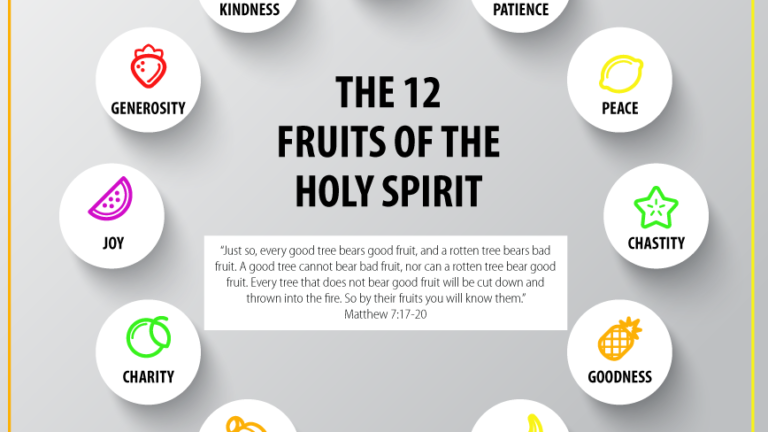Recalling a statement I made in yesterday’s reflection: “opening of our lives more fully to the Spirit of God is the journey of a lifetime, a journey we are asked to be faithful to until the end of our earthly lives,” it becomes apparent that the Lord wants us to walk in the Spirit while on life’s journey with Him. Once we are reborn by ‘water and the Spirit’ at baptism and sealed with the gifts of the Holy Spirit at Confirmation, we become filled with the Holy Spirit and power; thus, the Holy Spirit dwelling within us allows us to possess the virtues of Christ, enabling us to live in accordance with the will of God, manifesting the fruits of the Holy Spirit. The Greek word ‘καρπός’ that we translate as ‘fruit’ usually means fruit in the edible sense of the word, but it can also be translated as offspring, deed, action, result, or profit. In an agrarian society (i.e. agricultural society – any community whose economy is based on producing and maintaining crops and farmland), fruit is a good thing; it is the result of hard work and careful tending. Today we use the word ‘fruit’ in a phrase such as the ‘fruit of our labour’ to communicate the results of our effort. Thus, ‘fruit’ in this sense can mean ‘deed, action, or result’.
On the Fruits of the Holy Spirit, the Catechism of the Catholic Church (CCC) #1832 states: “The fruits of the Spirit are perfections that the Holy Spirit forms in us as the first fruits of eternal glory. The tradition of the Church lists twelve of them: charity, joy, peace, patience kindness, goodness, generosity, gentleness, faithfulness, modesty, self-control, chastity.” Saint Paul on the other hand, lists nine of them in his letter to the Galatians 5:22-26: ‘love, joy, peace, patience, kindness, generosity, faithfulness, gentleness, self-control.’ These are the result or the work of the Spirit in the life of every baptized and practising Catholic. Likewise, these manifestations are what we see in the lives of the early Christians as described in the First Reading (cf. Acts. 4:32-37). We were told that the whole group of believers was united, heart and soul; no one claimed for his own use anything that he had, as everything they owned was held in common (modesty, charity – love). We also learned that none of their members was ever in want, as all those who owned land or houses would sell them, and bring the money from them, to present it to the apostles; it was then distributed to any members who might be in need (charity, kindness, goodness, generosity). Luke also tells us that there was a Levite of Cypriot origin called Joseph whom the apostles surnamed Barnabas (which means ‘son of encouragement’). He owned a piece of land and he sold it and brought the money, and presented it to the apostles (charity, faithfulness, generosity, kindness, self-control). This way of life reflects a practical example of those born of the Spirit; and this underscores Christ’s teaching in today’s Gospel Reading (cf. John 3:7-15) – his conversation with Nicodemus. Here, Jesus stresses the importance of rebirth in the Spirit (baptism) in order to be receptive to the wind of the same Holy Spirit. This would enable us to believe in him in order to have eternal life.
Dear friends in Christ, the fruits of the Spirit is a physical manifestation of a life in the Spirit. Scripture says ‘So by their fruits you shall know them’ (Mat. 7:17-20). The fruits of the Holy Spirit are the evidence that He lives in and directs us. These fruits should be visible in Christians, for thereby men will know that the Holy Spirit dwells in them, just as the tree is known by its fruits. The Holy Spirit comes upon us in every Eucharistic celebration when we receive the Body and Blood of Christ, in order to empower us to bear good fruits. Therefore, let us cooperate with the graces of the Holy Spirit offered in every holy Mass and yield good fruits by our way of life.
Shalom!
© Fr. Chinaka Justin Mbaeri, OSJ
Paroquia Nossa Senhora de Fatima, Vila Sabrina, São Paulo, Brazil
nozickcjoe@gmail.com / fadacjay@gmail.com





God bless you Padre!